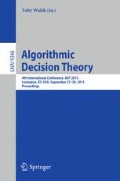Abstract
For agents it can be advantageous to vote insincerely in order to change the outcome of an election. This behavior is called manipulation. The Gibbard-Satterthwaite theorem states that in principle every non-trivial voting rule with at least three candidates is susceptible to manipulation. Since the seminal paper by Bartholdi, Tovey, and Trick in 1989, (coalitional) manipulation has been shown \(\mathrm{NP}\)-hard for many voting rules. However, under single-peaked preferences – one of the most influential domain restrictions – the complexity of manipulation often drops from \(\mathrm{NP}\)-hard to \(\mathrm{P}\).
In this paper, we investigate the complexity of manipulation for the k-approval and veto families of voting rules in nearly single-peaked elections, exploring the limits where the manipulation problem turns from \(\mathrm{P}\) to \(\mathrm{NP}\)-hard. Compared to the classical notion of single-peakedness, notions of nearly single-peakedness are more robust and thus more likely to appear in real-world data sets.
Access this chapter
Tax calculation will be finalised at checkout
Purchases are for personal use only
References
Bartholdi, J., Tovey, C., Trick, M.: The computational difficulty of manipulating an election. Soc. Choice Welfare 6(3), 227–241 (1989)
Black, D.: On the rationale of group decision making. J. Polit. Econ. 56(1), 23–34 (1948)
Brandt, F., Brill, M., Hemaspaandra, E., Hemaspaandra, L.A.: Bypassing combinatorial protections: polynomial-time algorithms for single-peaked electorates. In: Proceedings of the 24th AAAI Conference on Artificial Intelligence (AAAI 2010), pp. 715–722. AAAI Press (2010)
Bredereck, R., Chen, J., Woeginger, G.J.: Are there any nicely structured preference profiles nearby? In: Proceedings of the 23rd International Joint Conference on Artificial Intelligence (IJCAI 2013), pp. 62–68. AAAI Press (2013)
Conitzer, V., Sandholm, T., Lang, J.: When are elections with few candidates hard to manipulate? J. ACM vol. 54(3), Article 14 (2007)
Cornaz, D., Galand, L., Spanjaard, O.: Bounded single-peaked width and proportional representation. In: Proceedings of the 20th European Conference on Artificial Intelligence (ECAI 2012). Frontiers in Artificial Intelligence and Applications, vol. 242, pp. 270–275. IOS Press (2012)
Cornaz, D., Galand, L., Spanjaard, O.: Kemeny elections with bounded single-peaked or single-crossing width. In: Proceedings of the 23rd International Joint Conference on Artificial Intelligence (IJCAI 2013). pp. 76–82. AAAI Press (2013)
Elkind, E., Lackner, M.: On detecting nearly structured preference profiles. In: Proceedings of the 28th AAAI Conference on Artificial Intelligence (AAAI 2014). pp. 661–667. AAAI Press (2014)
Elkind, E., Lackner, M.: Structure in dichotomous preferences. In: Proceedings of the 24th International Joint Conference on Artificial Intelligence (IJCAI 2015). AAAI Press (to appear 2015)
Ephrati, E., Rosenschein, J.: A heuristic technique for multi-agent planning. Ann. Math. Artif. Intell. 20(1–4), 13–67 (1997)
Erdélyi, G., Lackner, M., Pfandler, A.: Computational aspects of nearly single-peaked electorates. In: Proceedings of the 27th AAAI Conference on Artificial Intelligence (AAAI 2013), pp. 283–289. AAAI Press (July 2013)
Escoffier, B., Lang, J., Öztürk, M.: Single-peaked consistency and its complexity. In: Proceedings of the 18th European Conference on Artificial Intelligence (ECAI 2008). Frontiers in Artificial Intelligence and Applications, vol. 178, pp. 366–370. IOS Press (2008)
Faliszewski, P., Hemaspaandra, E., Hemaspaandra, L.A., Rothe, J.: The shield that never was: societies with single-peaked preferences are more open to manipulation and control. Inf. Comput. 209(2), 89–107 (2011)
Faliszewski, P., Hemaspaandra, E., Hemaspaandra, L.A.: The complexity of manipulative attacks in nearly single-peaked electorates. Artif. Intell. 207, 69–99 (2014)
Garey, M., Johnson, D.: Computers and Intractability: A Guide to the Theory of NP-Completeness. W. H. Freeman and Company, New York (1979)
Ghosh, S., Mundhe, M., Hernandez, K., Sen, S.: Voting for movies: The anatomy of recommender systems. In: Proceedings of the 3rd Annual Conference on Autonomous Agents (AGENTS 1999), pp. 434–435. ACM Press (1999)
Gibbard, A.: Manipulation of voting schemes. Econometrica 41(4), 587–601 (1973)
Hemaspaandra, E., Hemaspaandra, L.: Dichotomy for voting systems. J. Comput. Syst. Sci. 73(1), 73–83 (2007)
Procaccia, A.D., Rosenschein, J.S.: Junta distributions and the average-case complexity of manipulating elections. J. Artif. Intell. Res. (JAIR) 28, 157–181 (2007)
Satterthwaite, M.: Strategy-proofness and Arrow’s conditions: existence and correspondence theorems for voting procedures and social welfare functions. J. Econ. Theor. 10(2), 187–217 (1975)
Walsh, T.: Uncertainty in preference elicitation and aggregation. In: Proceedings of the 22nd AAAI Conference on Artificial Intelligence (AAAI 2007). pp. 3–8. AAAI Press (2007)
Xia, L.: Designing social choice mechanisms using machine learning. In: Proceedings of the 12th International Conference on Autonomous Agents and Multiagent Systems (AAMAS 2013), pp. 471–474. International Foundation for Autonomous Agents and Multiagent Systems (2013)
Acknowledgments
We thank the anonymous ADT-2015 referees for their very helpful comments and suggestions. This work was supported by the Austrian Science Fund (FWF): P25518, Y698, and the German Research Foundation (DFG): ER 738/2-1.
Author information
Authors and Affiliations
Corresponding authors
Editor information
Editors and Affiliations
Rights and permissions
Copyright information
© 2015 Springer International Publishing Switzerland
About this paper
Cite this paper
Erdélyi, G., Lackner, M., Pfandler, A. (2015). Manipulation of k-Approval in Nearly Single-Peaked Electorates. In: Walsh, T. (eds) Algorithmic Decision Theory. ADT 2015. Lecture Notes in Computer Science(), vol 9346. Springer, Cham. https://doi.org/10.1007/978-3-319-23114-3_5
Download citation
DOI: https://doi.org/10.1007/978-3-319-23114-3_5
Published:
Publisher Name: Springer, Cham
Print ISBN: 978-3-319-23113-6
Online ISBN: 978-3-319-23114-3
eBook Packages: Computer ScienceComputer Science (R0)

